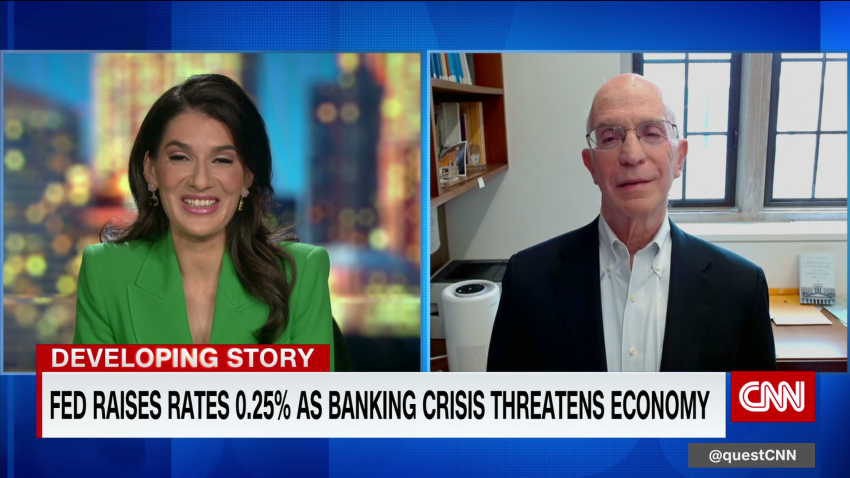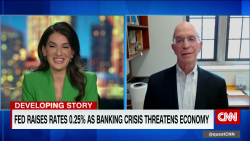A version of this story first appeared in CNN Business’ Before the Bell newsletter. Not a subscriber? You can sign up right here. You can listen to an audio version of the newsletter by clicking the same link.
In the wake of Silicon Valley Bank’s collapse and subsequent banking meltdown, cash is king. The turmoil inflicted on financial markets has sent cautious investors running away from volatile markets and toward more liquid alternatives.
Money market funds, widely thought to be one of the safest, lowest-risk investment options, have seen an influx of cash in recent weeks as investors look for more stable ground.
These funds invest in short-term securities like government bonds, certificates of deposit — or fixed-term savings accounts — and commercial debt. The goal of a money market fund is to provide investors with a relatively stable investment option that offers higher returns than traditional savings.
But money markets aren’t without risks of their own, especially when they experience a large wave of investors all at once.
What’s happening: Since the Fed began to raise interest rates a year ago, the amount of money in money market funds has increased by roughly $400 billion. The inflows totaled more than $120 billion alone last week, according to Apollo Global Management. That means a record $5 trillion is currently invested.
The majority of the new money last week came from institutional investors, who put about $101 billion into the funds. Investments from retail investors made up about $20 billion, according to the Investment Company Institute.
Still, retail investors could soon pick up the pace. Goldman Sachs economists wrote in a note on Thursday that Americans could sell as much as $1.1 trillion in stocks this year and put that money into credit and money market assets instead.
Not-so-safe haven: But the more money there is invested in these funds, the greater the risk that cash could also flow out quickly, creating a money-market liquidity crisis — where funds may not have enough cash on hand to meet those redemptions.
Money market funds are deeply interconnected with the wider financial system, and often face the same risks as banks.
They typically invest in securities with maturities of 90 days or less, meaning they are very sensitive to changes in interest rates. They also invest heavily in commercial debt — if there’s a significant economic downturn the issuers could default on their obligations.
Recent meltdowns: Money markets last experienced a meltdown in the pandemic-induced panic of 2020 that required the US Department of the Treasury and the Federal Reserve to step in to prevent a destabilizing rapid withdrawal of money from the funds.
Funds that aren’t banks “can take the existing stress in the financial system and amplify it,” said US Treasury Secretary Janet Yellen at the time.
Regulations and updates were suggested by the Treasury in the wake of the turmoil, but the vulnerabilities exposed during the panic have yet to be addressed. New proposals for increasing investor safety are expected to be unveiled by the Securities and Exchange Commission next month.
The Federal Deposit Insurance Corporation, a US government agency that insures deposits in banks and savings associations, does not insure cash invested in money market funds. Those funds are also not guaranteed by the US government.
Short-seller Hindenburg targets Jack Dorsey’s Block
Shares of Block, the company behind Cash App, plunged by 20% Thursday morning after the release of a searing report from short-seller Hindenburg Research. The report accused Jack Dorsey’s company of allowing fraudulent accounts that obscure criminals involved in illegal or illicit activities, including the sex trafficking of minors.
Hindenburg’s attack on Block comes two months after the short seller’s allegations against Adani Group erased billions of dollars from the Indian conglomerate’s market value.
Hindenburg says its two-year investigation into Block — which also owns Square, Weebly, Afterpay and music streaming service Tidal — found that “Block has systematically taken advantage of the demographics it claims to be helping.”
Block is not a disruptive innovator, claims the report, but instead benefits from “a willingness to facilitate fraud against consumers and the government, avoid regulation, dress up predatory loans and fees as revolutionary technology, and mislead investors with inflated metrics.”
In a statement to CNN, Block called the report “factually inaccurate and misleading,” and said it intends to work with the Securities and Exchange Commission and explore legal action against Hindenburg.
“Hindenburg is known for these types of attacks, which are designed solely to allow short sellers to profit from a declined stock price. We have reviewed the full report in the context of our own data and believe it’s designed to deceive and confuse investors,” Block wrote.
The Hindenburg report claims that Block is regulated like the “Wild West” and allows fraudulent accounts, which gives cover for criminals involved in illegal or illicit activities, including the sex trafficking of minors.
The report cites “numerous indictments by the Department of Justice, which detail Cash App’s use to facilitate sex, including with minors.” It also references a quote from Sara Crowe, senior director at the anti-human trafficking nonprofit Polaris Project, where she says that “when it comes to sex trafficking in the US, by far the most commonly referenced platform is Cash App.”
Hindenburg alleges that there is even a Baltimore-based gang named after Cash App. In 2021, members of the “Cash App” gang were charged with distributing fentanyl, the report said.
Banks continue to rely on the Fed for emergency funds
Banks borrowed less this week from Federal Reserve emergency backstop funds than last, but not by much.
The Federal Reserve lent financial institutions a total of $163.9 billion in the week through March 22, compared with $164.8 billion last week, according to Fed data released Thursday.
But, as part of that total, banks borrowed $53.7 billion — nearly five times more this week than last — under the Fed’s newly launched Bank Term Funding Program.
The elevated numbers this week signal that turmoil is still working its way through the banking system. That turmoil has led some banks to look for quick access to cash to make customers whole or increase liquidity, which is what the central bank programs seek to provide.
Prior to the banking meltdown, those numbers had averaged around $10 billion a week.

























